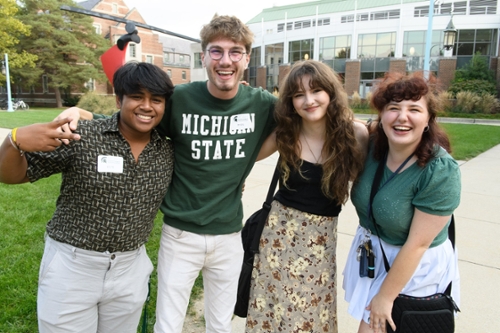About RCAH | Michigan State University

The Residential College in the Arts and Humanities:
MSU’s Community and Creativity Incubator
The Residential College in the Arts and Humanities (RCAH) at Michigan State University actively deploys the arts and humanities to solve complex problems and inspire change in the world.
Offering an atypical, personalized major and a one-of-a-kind residential community, RCAH has all the benefits of a small college—with the myriad opportunities of a Big Ten university like MSU.
Contact Us Schedule a Visit
What Is a Residential College?
Residential colleges offer opportunities for creative collaboration and discovery in a focused community where students in the same major live, attend class, socialize and form lifelong connections with friends and mentors.
The integration of academics and student life at RCAH looks like:
- An average class size of 15 students
- Classes taught by faculty members and practicing professionals
- A rigorous major where students refine skills employers seek
- 99 percent of new grads landing in a preferred job or graduate program
Our History
The MSU Residential College in the Arts and Humanities opened its doors to students for the first time in 2007. Since that time, we’ve welcomed hundreds of students each year into our student-centered college guided by people, passion, purpose and place.
We celebrate our success and recognize our achievements as individuals and a community of change-makers and critical thinkers. In 2017, more than 300 alumni, students, faculty and staff traveled back to campus from around the world to commemorate RCAH's first decade.
Hear From Our Community
Hear directly from RCAH students, faculty, staff, and graduates to understand all we can accomplish together.
RCAH: Live Your Learning YouTube Video
Visit RCAH
See our welcoming academic community for yourself during an on-campus tour and experience RCAH firsthand in a group or individual visit. We look forward to seeing you and your family during the week or on the weekend.
Can’t make it in person? We also offer virtual visits and the helpful Discover RCAH webinar series get answers to your questions about RCAH, MSU, and your college search.
Plan a Visit
Why Choose MSU’s Residential College in the Arts and Humanities?
Programming That Nurtures Your Growth
Interdisciplinary in nature, courses in the arts and humanities major at RCAH encourage you to think outside the box and approach contemporary issues with fresh perspectives. Our classes enable you to make connections across disciplines and develop your unique voice, ultimately helping you shape your path after graduation.
Academics
Live Your Learning Through Student Life
Enriched by our lively living-learning community, your education happens both inside and outside of the classroom. Beyond Snyder-Phillips, the RCAH residence hall, you have access to all MSU and the East Lansing area have to offer, including our over 800 student organizations and local neighborhood and community learning events.
Student Life
Build Intentional Relationships With Faculty
Beyond the lasting connections you create with your peers, you establish intentional, mentoring relationships with RCAH faculty as you explore your interests and prepare for your future. Bringing their diverse backgrounds into harmony, our faculty members, fellows and staff work together to make RCAH a safe place for you to try new things, develop your skills and positively impact our community and the world.
RCAH Faculty
Ways to Fund Your Arts and Humanities Education
We aim to make education more accessible through numerous funding opportunities, and in fact, 70 percent of incoming MSU first-year students receive some form of financial aid. You can seek out scholarships specific to RCAH that help make your degree more affordable. We are also proud to offer the Emergency Assistance Fund, managed by the MSU Division of Student Affairs and Services and available to students experiencing financial hardship.
Scholarships and Aid
Mission, Vision, and Values
Focused on the ongoing transformative work of radically reciprocal teaching and learning, RCAH’s mission and values drive our programming. We aim to support students and faculty as they engage in work that challenges norms, addresses inequities and mobilizes the arts and humanities as a force of good.
Our values include that RCAH:
- Seeds change
- Builds community
- Creates inclusive futures
- Fosters radical reciprocity
- (Re)imagines possibilities for social justice
Connect With Us
Request information today to learn more about MSU’s Residential College in the Arts and Humanities and how you can join us!

